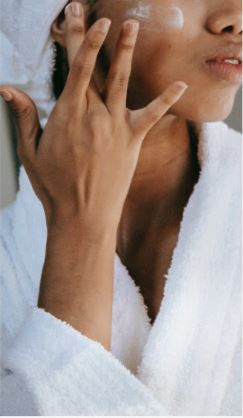Hydration vs. Moisturization
Is there really a difference between hydration and moisturization?
The answer to that is yes and no. Hydration is simply the process of absorbing water to properly support the body. Moisture refers to the presence of a liquid, specifically water, often in trace amounts. Small amounts of water may be found, in the air we breathe, in our living foods, and in various skincare products.

Satisfactorily hydrated skin and ideal water levels in the body help to sustain good dermal health and fight early signs of aging. However, as we age, this natural function slows down. We use moisture (found in creams and moisturizers) to support natural losses and make up for the hydration deficiencies with ingredients like humectants and emollients. These ingredients help retain hydration levels. Occlusives somewhat “lock in” hydration to help the skin feel more hydrated for a longer period of time.
Since 70% of the body is composed of water, maintaining adequate hydration all throughout the day is essential for ensuring optimal functioning of the body. Sufficient hydration in the skin is measured through the skin’s ability to replenish hydration levels with enough water. Although our body produces and retains water naturally, it gradually loses this ability over the years resulting in a negative effect on the water levels of the body. Thus, our skin requires constant hydration to maintain the right levels of water. Doesn’t this make you want to reach for a refreshing glass of clean H2O?
If your skin is not getting enough water, the lack of hydration will present itself by turning your skin dry, tight, flaky, or worse, wrinkly. Dry skin has less resilience because the barrier function is lowered. As water is lost in large quantities every day, you need to replace it somehow. Remember, hydrated skin helps in the absorption of nutrients. Water is responsible for successful absorption of the nutrients and minerals by the skin cells. Healthy, hydrated skin truly starts within.
Let’s also cover the toxin topic. The skin is a detoxifying organ. The skin is responsible for removing toxins from the body. This can only be done if the skin contains sufficient levels of water in it. Along with toxin removal, water also improves digestion and circulation in the body. This concept reveals itself through our Skin Map. Dehydration presents itself in the Digestive Zone on the face. Often when dealing with acne, increasing water intake allows to properly flush out toxins present in the skin.
So, how much water is required?

The U.S. National Academies of Sciences, Engineering, and Medicine recommends that an adequate daily fluid intake is:
- About 15.5 cups (3.7 liters) of fluids a day for men
- About 11.5 cups (2.7 liters) of fluids a day for women
Excessive salt, sugar, coffee, and alcohol are diuretics that work against these levels. Drink small amounts of water throughout the day in between meals. This helps to sustain the longevity of overall hydration. Proper water intake can make the skin look smoother, impeccable, and more vibrant.
A moisturizer, or oil, helps to support the simple aging process of water loss. Moisturization functions are normally performed by sebum produced by healthy skin. When the health of the skin is compromised, this natural function begins to work ineffectively. Climate, diet and lifestyle may influence the speed of this process as well.
Can you have too much of a good thing?
Sometimes, too much moisture rich ingredients over-hydrate the skin, making it weak and more sensitive to resistance and breakdown. A healthy balance of hydration and moisturization is what will propel the skin into optimal health. Nutrient rich serums like Gentle Retinal Serum and Advanced Retinal Serum are able to help to naturally train the skin to increase hydration levels (in addition to collagen manufacturing) during the aging process.
Looking to the help of moisturizers like Nourishing Moisturizer and Smoothing Face and Neck Cream can prove to be beneficial. These skin care products have the right levels of minerals, vitamins, emollients, and most importantly water, in them. When it comes down to it, consider this, the purpose of a moisturizer is to help to keep the skin well hydrated, nourished and support the aging journey.
|
TOP PRODUCT SUGGESTIONS TO SUPPORT YOUR OWN SKIN'S HYDRATION AND BARRIER
|
|
Nourishing Moisturizer
|








